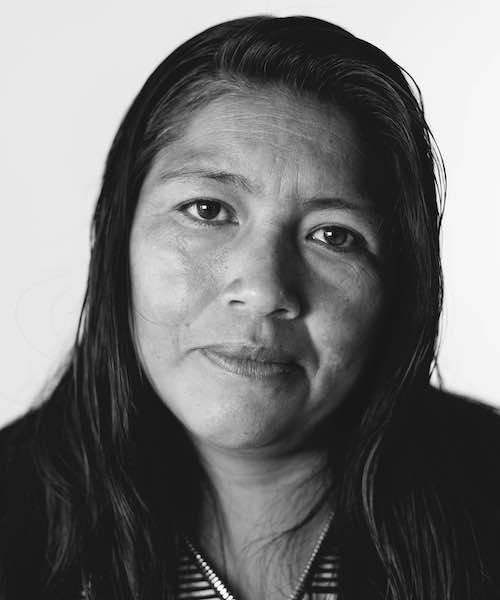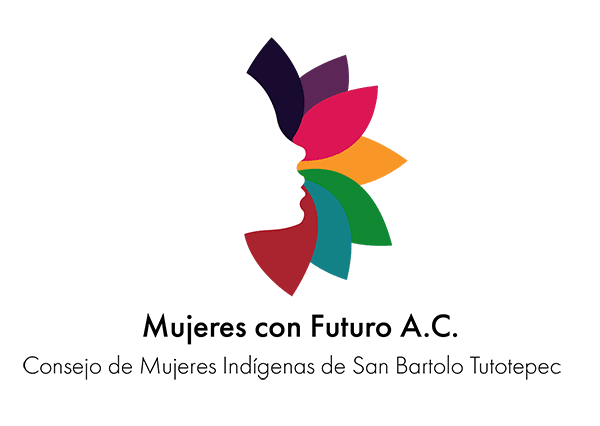
RUFINA GUZMÁN GUZMÁN
Otomi Partner, Mujeres con Futuro
Community of Piedra Blanca, San Bartolo Tutotepec, Hidalgo
MY POEM
La lluvia que me da vida y me alegra
Como un atardecer
cada que la miro yo quisiera florecer.
MY STORY
I am a worker. I like to work in the field and I love to embroider. I have brought up my children. I believe in the customs of our grandparents, in worshipping the hills and nourishing Mother Earth so she can give us corn, beans, and coffee.
Through my PSYDEH school, I learned how to manage resources, respect others, participate in workshops, and organize my time effectively. I currently work in the field. I also make embroidery and take care of my children. In my community, I served as a delegate for six years. In this capacity, I sought support for housing, seeds, and livestock as well as in [preparing] for the patron saint festivals.
My motivation is to learn new things and share them with my peers in [different] communities so that women do not remain trapped or isolated. As both a delegate and participant in PSYDEH, I have learned how to complete an application, including how to fill out all of the [required] documents. I have also learned how to reach agreements within our group of advisors as well as with other people.
One challenge is the distance. Leaving my children alone is difficult [for me]. Still, I feel proud that people give me a chance. I come and talk to them, and they do not reject me. They support me.
When I first started going to the workshops, my partner would not let me [attend]. He would not allow me to leave home. He scolded me. He even hit me. So we separated. It was my daughter who said to me, ‘Let’s go. Why are we here? You are the one who has raised us.’ My partner worked only enough to sustain his alcoholism. From there, we parted and each went our own way. I stayed with my daughter who is now studying.
Now I am in charge of my daughter’s expenses. I had the courage to become a delegate[1]. As women, we agreed to take on that position. We built a foundation and arranged benches. This compelled some people to reconsider us and recognize all the time we invested in our work. A few nurses came and I asked them to facilitate some workshops to help men and women learn something. There were several cases of sexual violence [in the community]; little by little, that changed. Men are jealous, but we engaged with them and some began to understand.
I am a leader because I have completed several projects and I have supported people in need. I feel fully capable to continue working in my community. On the council, we have already been able to develop a sustainability project focused on seeds. We have also been working on several training sessions. For example, I would like to offer training on violence prevention and raise awareness among young people to reduce the number that become parents by age thirteen.
I encourage my daughter to study, work, and own her own home. Before, I did not go out; I was trapped. But now that I started attending the workshops, I feel independent. I have work at home with my farmland, animals, and embroidery. Some people think you are just there doing nothing, but I always have work to do.
To be a leader is to work in a group and make progress. I am proud because in my community, people elected me as a delegate for six years. More than anything, [being a leader] meant extending help and support to the people who needed it most – I applied for their homes and building foundations. For me, leadership was to support those most in need. My dream was always to become a delegate or an assistant. Step by step, I arrived; with work, but I arrived.
[1] Currently, some Indigenous municipalities have become more flexible in allowing women to participate in community leadership. This is mainly due to the migration of men. Some studies, such as “The Negotiation of Gender Relations in the Valley of Mezquital: An Approach to the Case of the Community Participation of Hñähñu Women” by Rivera, Guadalupe (2006), explain that Indigenous women have been assuming community posts. This is the case of San Bartolo Tutotepec, which is the first municipality in the Otomí-Tepehua region where – in the face of men’s migration – Indigenous women are elected to community assemblies as delegates of their communities.

